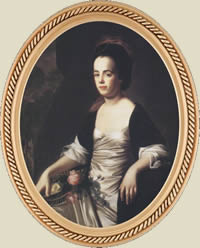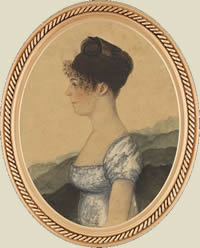

Most of the plays performed at the Federal Street Theater in the 1790s were British imports, including regular offerings of Shakespeare. But two extraordinarily energetic and forward-thinking women living in Boston—Judith Sargent Murray (1751–1820) and Susanna Haswell Rowson (1762–1824)—dared to have their plays produced. Perhaps because they were women and early feminists to boot, both endured harsh treatment in the press.
Murray moved to Boston in the autumn of 1794, six months after the Federal Street Theatre opened. Confident that women were intellectually equal to men, she wrote the first two plays by a Bostonian performed here. Murray’s The Traveller Returned is a conventional comedy with one exception: its central female character, Mrs. Montague, is both an intellectual and a scholar. After it debuted anonymously on March 9, 1796, Murray was frustrated when a reviewer suggested that the author was her husband, a prominent universalist minister.
Rowson’s Slaves in Algiers (1794), performed first in Philadelphia, features strong female characters and a saucy epilogue Rowson herself delivered. In it she jokes about the idea that “Women were born for universal sway; Men to adore, be silent, and obey.” William Cobbett (1763–1835), journalist and pamphleteer, was clearly not amused. After the play was performed in Philadelphia, in a review titled “A Kick for a Bite,” he called Rowson “the American Sappho” and described Slaves in Algiers as an “unparalled [and deceptive] play.” In response, the poet and politician John Swanwick (1740–98) published a rebuttal titled “A Rub for a Snub,” and Rowson called Cobbett a “loathsome reptile.”
